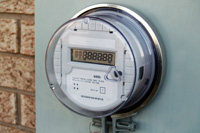Back to Newsletter Archive | Back to Island Voices
March 2011 Newsletter for Seniors on Vancouver Island
The tragic events that have happened in Japan highlights once again how fortunate we are to live on Vancouver Island. The earthquake followed by the tsunami and subsequent effects on a nuclear power plant must surely be the modern equivalent of the biblical curses that were endured by the Egyptians over 2000 years ago. This set of circumstances is unlikely to be duplicated in British Columbia as we have an abundance of safe, clean hydro electricity because of the foresight displayed by politicians, industry and the citizens of this province in the middle of the last century.
It seems that we are at a potential cross road where strong leadership will determine if we will pass on this legacy to future generations. There can be no doubt that we have to increase our ability to produce more electricity for our current and future needs. Two questions have to be addressed. How shall we produce our future energy needs and at what price, both financially and environmentally? I suggest that the province should expand on the system that has served us so well to date, namely hydro electricity. This system has stood the test of time and we are well equipped to increase all our future needs by expanding this as our primary production system. We should also actively support the research and development needed to supplement other complementary electricity production methods such as wind, tidal and geothermal, not just for our use but to assist other countries to meet their future needs.
The following article addresses some of the issues that are facing us now including costs and the potential safety issues surrounding so called ‘smart metres’. Smart metres are a subject all on their own that needs to researched and discussed openly by British Columbians. Get involved, do your on research, make your views known to our provincial politicians, so that we can collectively make the right decisions for us and for future generations. Decisions are going to be made in the very near future that will affect us all especially, as always, those on limited income which includes thousand of Seniors.
 Roy Summerhayes Seniors 101
Roy Summerhayes Seniors 101Roy Summerhayes
250-248-4837
 Smartmeter
SmartmeterJustify rate increases and smart meters, Coleman tells utility
How much flexibility the new energy minister will have in changing policies remains to be seen
BY GORDON HAMILTON, VANCOUVER SUN MARCH 17, 2011
Energy Minister Rich Coleman has put BC Hydro on warning, saying he intends to conduct an in-depth review of the utility and wants it to provide detailed justification for its plans for the province’s energy system.
He especially singled out the $1.1-billion smart metering program and a proposal to raise electricity rates 50 per cent over the next five years.
“One of the jobs I have to do, is go sit down with BC Hydro, look at their whole business plan, look at it for justifications of things they might or might not want to do and one of the issues is obviously those rates,” Coleman said in a scrum Tuesday before entering a caucus meeting in Victoria.
It’s also time for “a sober, second look” at the smart metering program, he said.
He said the role of the B.C. Utilities Commission in scrutinizing Hydro — altered in 2008 by the Gordon Campbell government — is also up for review.
BC Hydro turned down a request for an interview on Coleman’s plans for a review, restricting comment to a brief email statement by communications vice-president Renee Smith-Valade.
“We welcome minister Rich Coleman as British Columbia’s new minister of energy and mines. We look forward to developing a strong relationship with him and his team and engaging in a good discussion on the future of energy in B.C.,” she stated.
But how much flexibility the new energy minister will have in changing policies already underway remains to be seen.
University of B.C. energy policy expert George Hoberg said Campbell introduced a number of high-profile changes in energy policy, so it makes sense it would be one of the first issues Premier Christy Clark attempts to address.
“I’m not surprised that the Clark government would want to do a comprehensive review of these policies because Campbell really did bring in quite extensive changes to a number of areas in electricity policy.”
First, he said, politicians and the public need to adjust to the fact that Hydro is basing the rate increase on a long-overdue overhaul of the provincial electricity system.
“Electricity rates in British Columbia need to go up,” he said in an interview. “The request that BC Hydro is making for 50-per-cent rate increases does not include future growth of electricity supply.
“Those are designed to essentially upgrade the system that we have so successfully depended on for 50 years. It was built a long time ago and we haven’t invested in keeping it up.”
Hoberg said the new Clark government has two separate issues to deal with.
One is what needs to be done to maintain the existing power system, such as the rate increase and smart meters; the other is what is needed for the future, which includes contracts already signed with independent power producers.
Clark’s challenge will be to keep the issues separate. Her critics will try to link them, he said, making energy one of the hot-button issues in the next election.
In an interview, Paul Kariya of Clean Energy B.C. said regardless of whether new energy sources come from independent power producers or are developed by BC Hydro, capital costs will be far higher than they were when Hydro completed its last major project, the Revelstoke dam, in 1984.
Hoberg said smart metering is part of the package of things that need to be done now, but he sees no real benefit to it unless it is coupled with a timeof-use pricing policy, where consumers pay more at peak energy times of the day and less at times of lower demand.
“I have never understood the economic logic of having smart meters if you did not have time-of-use pricing.”
In its business plan for smart meters, Hydro lays out a number of benefits, but does not say specifically that there will be time-of-use pricing. Consumers will be able to monitor their use and make their own decisions, the plan states.
Future decisions are largely being driven by the Campbell government’s energy selfsufficiency policy, said energy watchdog Jim Quail, of the B.C. Public Advocacy Centre.
That policy calls for Hydro to achieve a surplus under all conditions except the very worst, “so it means in any real scenario there will be a surplus.
“There is some room there to avoid expenditures.”
Quail also criticized Hydro for publishing conflicting claims on the benefits of the meters. In its proposal to the B.C. Utilities Commission for rate increases over the next three years, Hydro states the $1.1-billion smart meter program will save $20.7 million by snuffing out energy theft.
But in its business plan, where it is trying to convince government that meters are a good thing, it states they will save $100 million.
“They give us a huge, unsubstantiated number when they want to show the meters are a good idea, but when it comes to identifying real savings, which they can pass on to customers, all they can find is $20.7 million, which is swamped in red ink from the huge cost of buying and installing the meters.”
© Copyright (c) The Vancouver Sun.
BY GORDON HAMILTON, VANCOUVER SUN MARCH 17, 2011
Start your own research into “Smart meters” here: – http://www.citizensforsafetechnology.org/smart-meters-and-grids-electricity-in-communities-governments,25,0 and then Google “Smart meters”.
